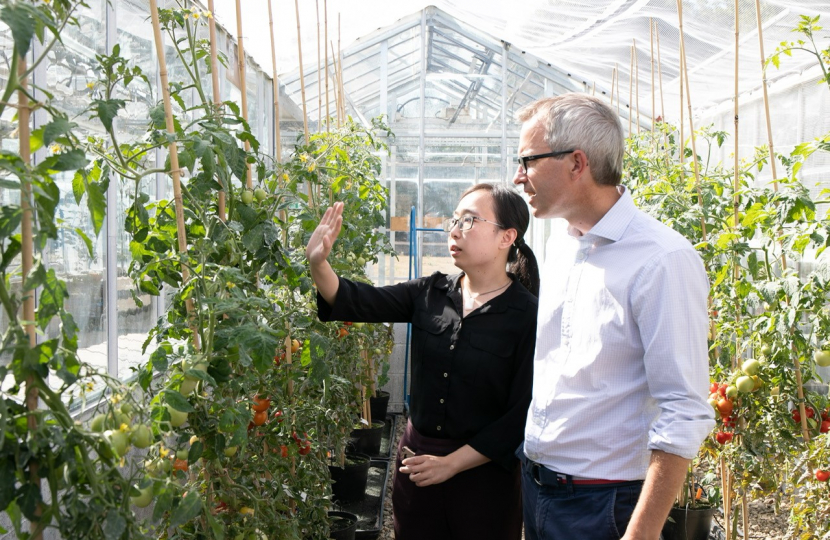
Legislation to unlock new technologies to boost food production and support farmers to grow more productive crops passed its House of Commons stages this week – paving the way for Britain to become the best place in the world to invest in agri-food research and innovation.
By introducing a more proportionate and science-based regulatory system for precision-bred plants and animals, it will unlock opportunities to develop crops that are more resilient against disease and the effects of climate change such as drought and flooding, and less reliant on pesticides.
The Genetic Technology (Precision Breeding) Bill covers precision-bred plants and animals developed through techniques such as gene editing, where the genetic changes could have occurred naturally or through traditional breeding methods. This is not GM food which involves adding DNA from other species
James spoke in support of the Bill when it was introduced and in the summer visited Norwich Research Park where gene editing is being pioneered including tomatoes with higher vitamin D.
While there is great potential for increasing innovation, the government recognises that there is a need to safeguard animal welfare in the new regulatory framework. That is why we are taking a step-by-step approach, enabling use of precision breeding technologies with plants first followed by animals later.
The Bill will:
- Remove plants and animals produced through precision breeding technologies from regulatory requirements applicable to the environmental release and marketing of GMOs (Genetically Modified Organisms).
- Introduce two notification systems; one for precision bred organisms used for research purposes and the other for marketing purposes. The information collected will be published on a public register on GOV.UK.
- Establish a proportionate regulatory system for precision bred animals to ensure animal welfare is safeguarded. We will not be introducing changes to the regulations for animals until this system is in place.
- Establish a new science-based authorisation process for food and feed products developed using precision bred plants and animals.
Opportunities brought by the new legislation:
Climate resilient wheat
- Developing wheat that is resilient to climate change will help to increase food production from a crop that 2.5 billion people are dependent on globally.
- Researchers at the John Innes Centre in Norwich have used gene editing techniques to identify a key gene in wheat that can be used to introduce traits such as heat resilience whilst maintaining high yield.
- This discovery presents an exciting opportunity to identify variations of the gene that can give wheat varieties resilience to climate change.
Non-browning banana
- Bananas are a key food crop globally - but there is significant wastage with over 50% not consumed and 10% - 15% lost due to fruit bruising post-harvest.
- Tropic, a leading agricultural biotechnology company in the UK, has recently developed a non-browning banana using precision breeding techniques.
- Given the fruit’s high perishability, this innovation has the potential to reduce the amount of bananas that are wasted, reduce carbon emissions and provide higher farmer revenues.
Disease resistant chickens
- Bird flu is a major threat to farmed chickens worldwide, with some strains killing up to 100 per cent of birds in a flock. In some cases, variants of the virus can infect people and cause serious illness.
- In a collaboration between Imperial College London, the Pirbright Institute and the Roslin Institute, a research study has shown potential in using gene-editing to produce chickens that are resistant to the disease. The virus was no longer able to grow inside cells with the genetic change.
- The use of gene editing could help to control the spread of the disease which is urgently needed to protect chickens and to reduce the risk to human health.
On Rothamsted Research:
Rothamsted Research is a world-leading, non-profit research centre that focuses on strategic agricultural science to the benefit of farmers and society worldwide.
It is also the longest-running agricultural research institution in the world dating back to 1843.
Its key aims include:
- Deliver know-how, data, better practices and new technologies to improve performance, resilience and value.
- Raise the productivity of crop and livestock systems.
- Tackle weed, disease and insect resistance to agrochemicals and improve soil health.
- Enhance natural capital and reduce agriculture’s carbon and nutrient footprint.
- Add novel nutritional, health and bioeconomical value to crops and other products.

